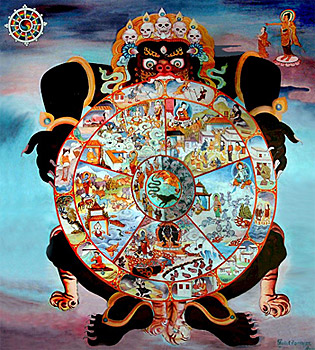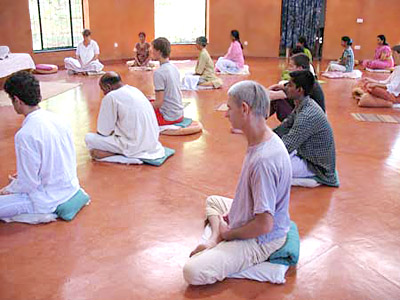 Another perspective of rebirth defines the cycle of death and rebirth in the context of consciousness rather than the birth and death of the body. In this perspective, the remaining impure aggregates, skandhas, reform the consciousness into a new form.
Another perspective of rebirth defines the cycle of death and rebirth in the context of consciousness rather than the birth and death of the body. In this perspective, the remaining impure aggregates, skandhas, reform the consciousness into a new form.
Buddhist meditation instructors advise that through careful observation of the mind, it is possible to see consciousness as being a succession of conscious moments, rather than a continuum of awareness. Each moment is an experience of an individual mind-state: a thought, a memory, a feeling, a perception. A mind-state originates, exists and, being impermanent, ceases following which the next mind-state develops. Hence the consciousness of a sentient being can be seen as a continuous chain of birth and death of these mind-states. In this context rebirth is just the persistence of this process. Understandably, this explanation of rebirth is wholly dissociated from rebirth which may follow bodily death.
 The explanation of rebirth as a cycle of consciousness is coherent with other core Buddhist beliefs, such as anicca (impermanence), dukkha (unsatisfactoriness) and anatta (non-self). Moreover, it is possible to observe a karmic connection between these mind-states.
The explanation of rebirth as a cycle of consciousness is coherent with other core Buddhist beliefs, such as anicca (impermanence), dukkha (unsatisfactoriness) and anatta (non-self). Moreover, it is possible to observe a karmic connection between these mind-states.
In the practice of Vipassana meditation, the meditator uses "bare attention" to observe the unending round of mind-states. This observation deduces insight and understanding from seeing this cycle of birth, death and rebirth without intervening, owning or judging the individual states of mind that originate and perish. This understanding enables them to restrict the power of desire, which according to the second noble truth of Buddhism is the cause of Dukkha (suffering, unsatisfactoriness), thus making possible the realisation of Nirvana. Thus it can be concluded that the interpreting of rebirth in the context of the cycle of consciousness is a precious and practical component of the cardinal aim of Buddhism.



















